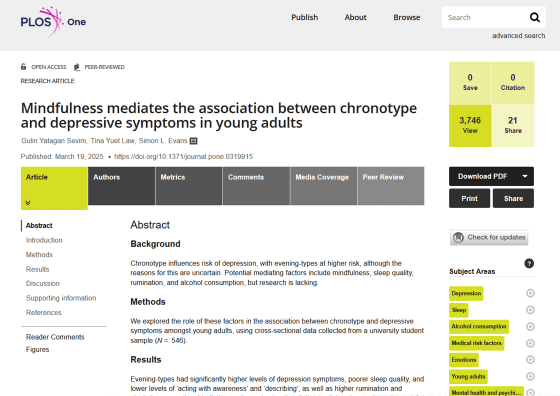Mindfulness may be effective in reducing depression risk for night-owls

Previous research has shown that people with night-type lifestyles
Mindfulness mediates the association between chronotype and depressive symptoms in young adults | PLOS One
https://journals.plos.org/plosone/article?id=10.1371/journal.pone.0319915

Night Owls Face Higher Depression Risk. A New Study Explains The Link. : ScienceAlert
https://www.sciencealert.com/night-owls-face-higher-depression-risk-a-new-study-explains-the-link
The research team explains that although it is known that night owls are at higher risk of depression, the reasons for this are not well understood. Potential factors linking night owls and depression include mindfulness, which focuses attention on current experiences, quality of sleep, rumination, which involves repeatedly thinking about negative things, and alcohol consumption, but there is a lack of concrete research results.
The study involved 546 undergraduate students from the University of Surrey completing an online survey to learn about their daily routines, subjective sleep quality, and various potential mediating factors between night-time habits and depression.
Only 38 of the subjects were classified as 'morning types,' 252 as 'evening types,' and the remaining 256 were classified as intermediate. In general, people in their late teens tend to be classified as evening types, and as they get older, they tend to become morning types. Therefore, it is not surprising that the subjects in this study, whose average age was about 20 years old, were more likely to be evening types.

As in previous studies, this study also found that night owls had significantly higher depressive symptoms than morning types or people with intermediate lifestyles. Night owls also had more rumination and significantly lower sleep quality. This may be due to
Further statistical analyses suggested that two mindfulness scales, specifically 'acting with awareness' and 'describing,' were factors that explained the association between depression and evening habits.
'Attentional behavior,' the ability to pay calm attention to emotions and thoughts without judging them as positive or negative, was particularly high in morning types, while 'description,' the ability to label emotions and thoughts, also influenced the association between depression and night owls.
Alcohol intake also affected the relationship between depression and lifestyle habits, but the effect was unexpected. Although alcohol intake is generally considered a risk factor for depression, and night owls consumed more alcohol overall, night owls who drank moderately had lower depression risk scores. The research team speculates that the reason for this may be that the subjects' alcohol intake was quite moderate, and they benefited from the social connections that come with drinking.

The research team concluded that, 'Given the growing popularity of mindfulness training for improving mental health, these findings suggest that the design of mindfulness interventions should prioritise strengthening the mindful behaviour dimension to maximise efficacy.'
'Our research shows that strategies to cultivate greater mindfulness, such as guided meditation and mindfulness exercises, can be effective,' said Simon Evans , a neuroscientist at the University of Surrey and co-author of the paper.
Related Posts:
in Science, Posted by log1h_ik







